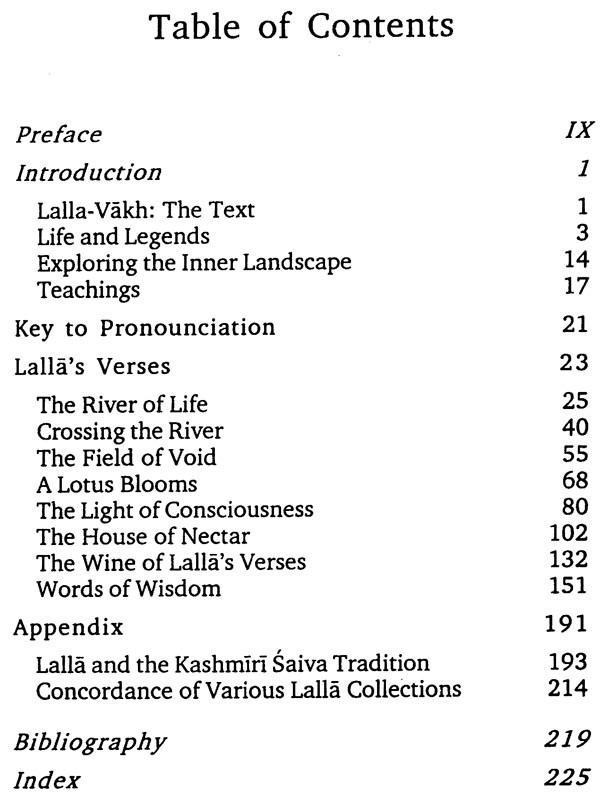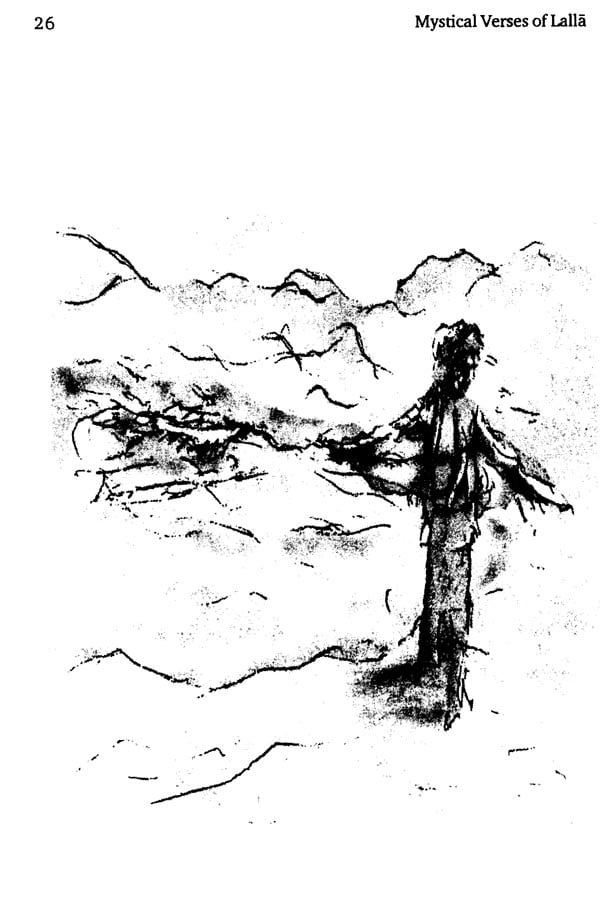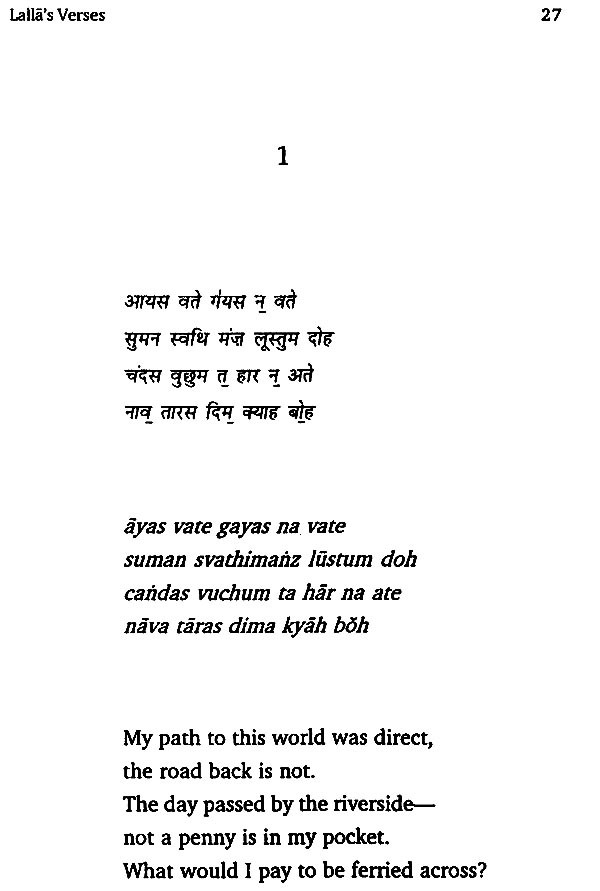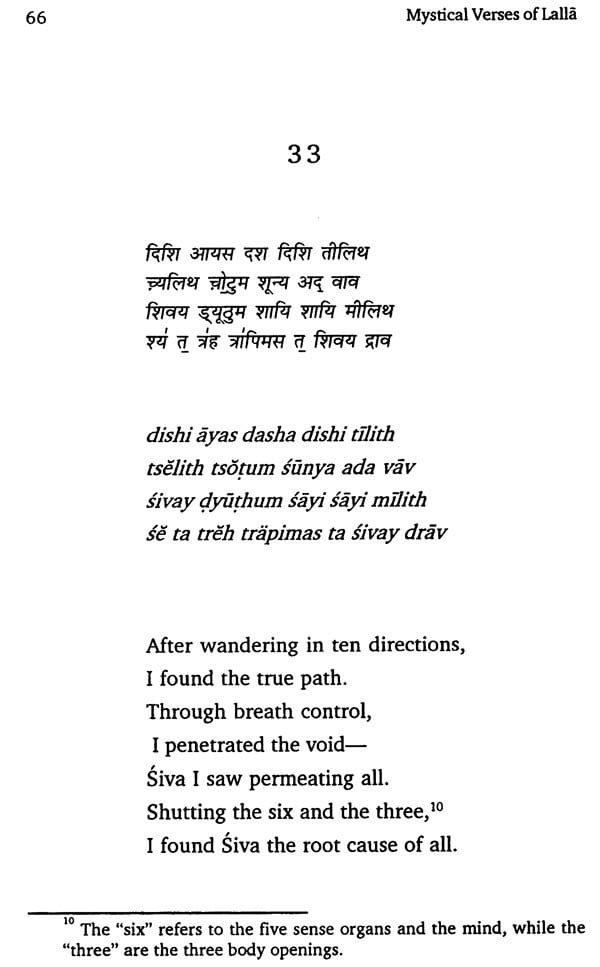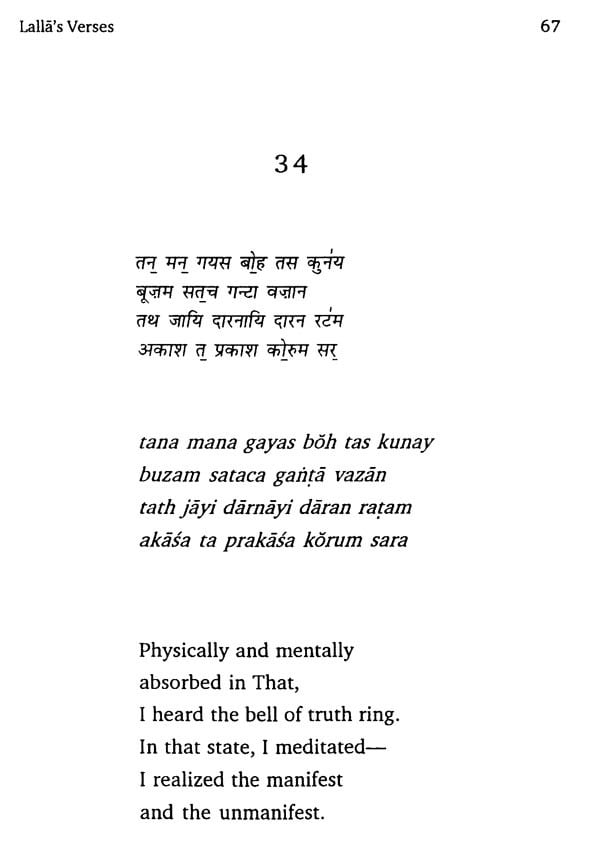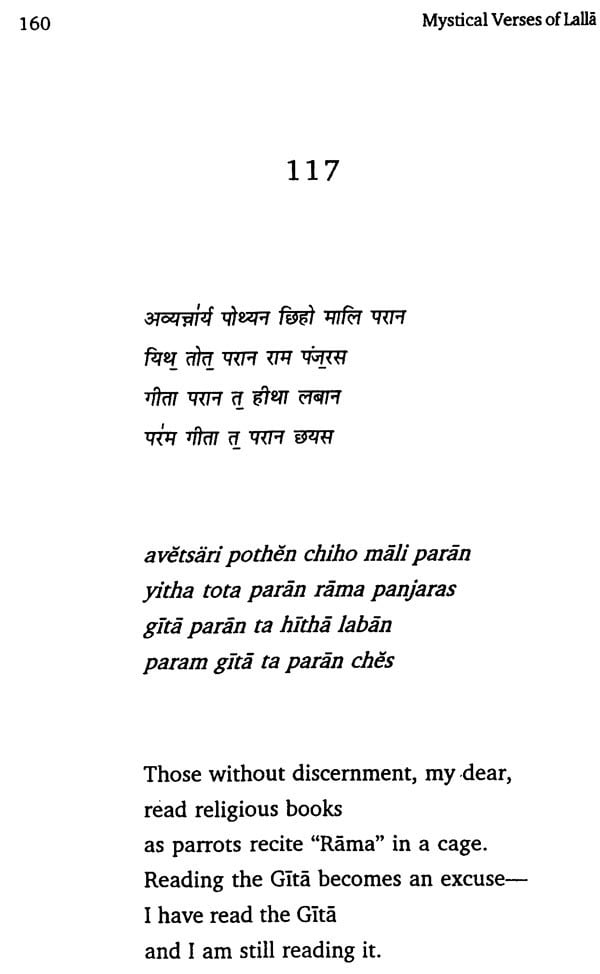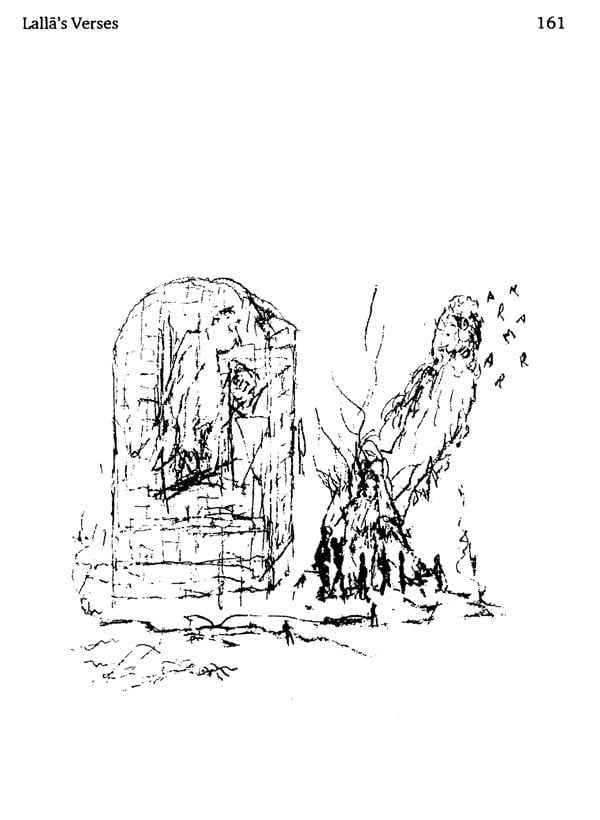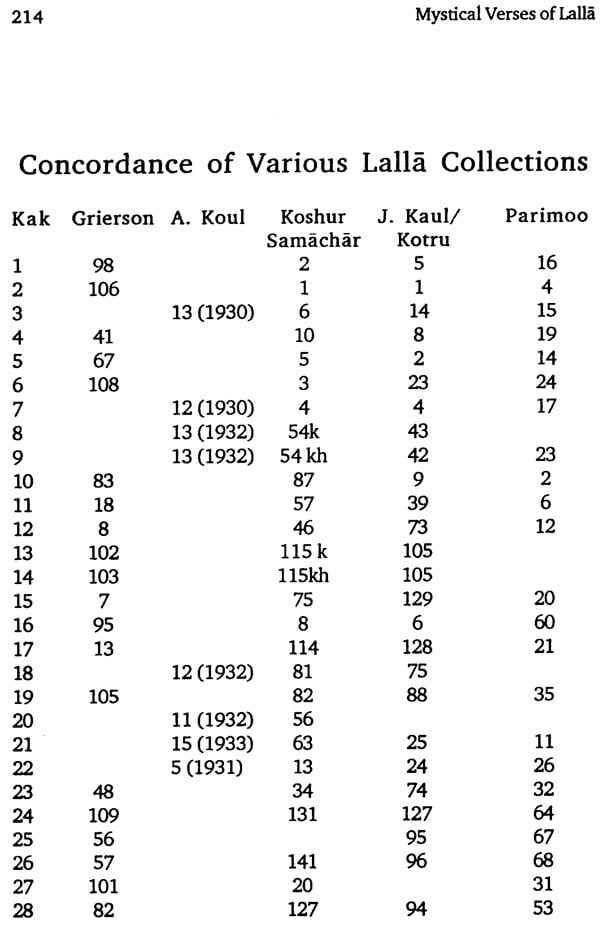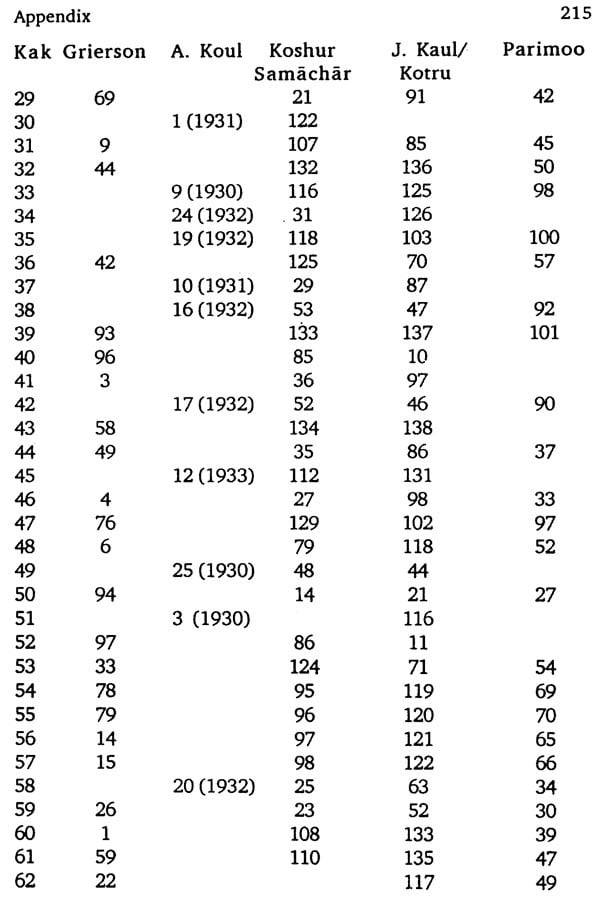
Mystical Verses of Lalla (A Journey of Self Realization)
Book Specification
| Item Code: | IDK087 |
| Author: | Jaishree Kak |
| Publisher: | MOTILAL BANARSIDASS PUBLISHERS PVT. LTD. |
| Language: | ENGLISH |
| Edition: | 2007 |
| ISBN: | 9788120832558 |
| Pages: | 227 (14 B/W Illustrations) |
| Cover: | Hardcover |
| Other Details | 9.00 X 6.00 Inches |
| Weight | 358 gm |
Book Description
Mystical Verses of Lalla is a rich introduction to Lalla, the great 14th century Kashmiri Saiva mystic whose verses were orally transmitted for centuries. Also known as Lallesvari and Lal Ded, she defied social conventions and proceeded on the journey of self-realization. Her verses speak across cultural boundaries and traditions and are as relevant today as they were six centuries ago. Jaishree Kak has beautifully translated the verses from Kashmiri into English. Joseph Singer's prints and drawings complement the verses, providing visual pathways into Lalla's verses.
About the Author
Jaishree Kak teachers at the University of Hawai. She is the another of To the other Shore: Lalla's Life and Verses.
Joseph Singer is an artist, photographer and writer. He has coauthored, with Jan Becket, Pana O' ahu: Sacred Stones, Sacred Land and with Kathy J. Phillips, This Isn't a Picture I' am Holding: Kuan Yin.
Preface
Growing up in Kashmir, I have memories of spectacular Himalayan Mountains, magnificent lakes, and countless rivers snaking through the valley, and accompanying all is the echoing on festive occasions of the melodious singing of Lalla's verse-sayings, popularly known as Lalla-Vakh. Her outpourings are timeless and people of all faiths have treasured them. The oral transmission for centuries illustrates the extent to which she has been a part of folk memory. My old aunts who grew up in Kashmir have memories of women reciting Lalla's verses while they spun fine shawls at the spinning wheel. Over the centuries, Lalla became the wise woman of Kashmiri culture. She was invoked not only at moments of personal dilemma but also to celebrate moments of social togetherness. I myself remember my mother singing Lalla's verses and occasionally quoting them in her conversations.
Lalla's verses provide a revealing glimpse into her life, serving as a vehicle for the reader to participate in her most profound spiritual and emotional experiences. Her entire oeuvre presents different stages of her journey to achieve mystic communion with her higher Self or Siva. Some of her verses deal with the early stages of her quest as she prepares her mind and body for a long and arduous journey through the inner landscape of mind. Others describe the advanced stages of her practice with sustained introspective contemplation, and yet others are uttered in the form of teachings to her community. Lalla's most profound verses are unmediated visions as she pours out her experiences into words.
Each verse, consisting of four lines, usually stands as an independent unit, though some are written as questions and answers. In translating verses, I have followed the originals as closely as possible in order to retain the spirit of Lalla's verses. I have tried to reproduce into translated language the inner form and rhythm of the originals in Kashmiri, as I see them, by playing with punctuations, phrase breaks and line breaks. Accordingly, even though each original verse is four lines long, some of the translated verses are longer. The original Kashmiri verse in Devanagari script accompanies each translated verse.
The present collection is a revised translation of the verses published in To the Other Shore, a critical study of Lalla's life and verses. This volume has been specifically prepared for different types of readers, especially the non-specialist. The readers interested only in Lalla's poetic outpourings have the English translations. Those proficient in the Kashmiri language can read the English translations with the originals in Kashmiri. A key to pronunciation of Kashmiri written in Devanagari script is provided for such readers. The collection also comes with a concordance of verses in various Lalla collections toward the end of the volume. For readers who wish to explore the Kashmiri Saiva philosophy that permeates Lalla's verses, a basic introduction to this thought system and its relevance to Lalla's verses is given in the appendix.
The preparation of this collection of verses has been a long journey, which started decades ago in Kashmir when I had the good fortune of meeting the late Kashmiri Saiva scholar and teacher Swami Lakshman Jee. He ignited the spark. Many years later, the spark blossomed into a deep desire to work on Lalla's verses, which became an anchor around which my study of the Kashmiri Saiva tradition took shape. In this endevour, I acknowledge the support of my family and friends, both old and new. I owe a special gratitude to my late father Ram Nath Kak who went over my translation of the verses and shared with me his unique knowledge of the Saiva tradition. This project would have been inconceivable without my mother Sarojini Kak who told me fascinating stories and legends about Lalla as I was growing up in Kashmir.
I especially feel honored by the contribution of Joseph Singer, an artist, photographer and printmaker. Singer brings to life essential themes of Lalla's life and poetry as he pours her vision into illustrations. His prints and drawings complement the verses, even entering into a conversation with them, thus providing visual pathways into the verses. Singer weaves a bridge between western and eastern sensibilities by translating the verses into a contemporary visual medium. Finally, I acknowledge the continuous support of my dear friend and colleague Kathy Phillips as she went over each verse with me to see if the original Kashmiri verse was translated in the best possible way within the constraints imposed by another language and another culture. She has my warm thanks.
**Contents and Sample Pages**
